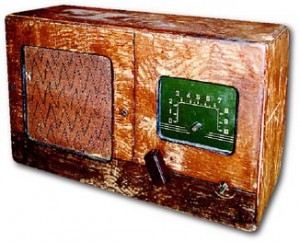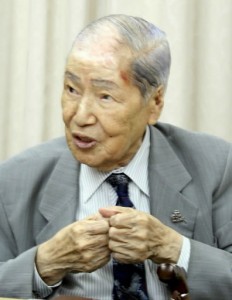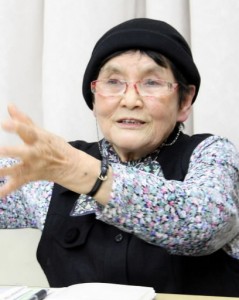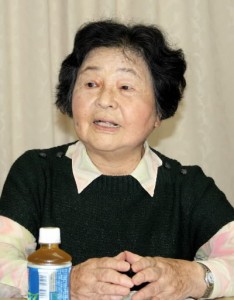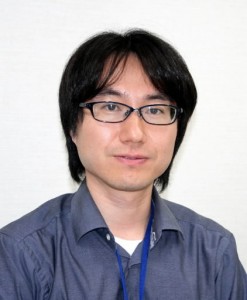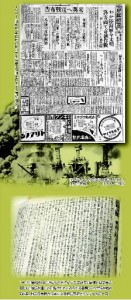Peace Seeds: Teens in Hiroshima Sow Seeds of Peace (Part 20)
Nov. 9, 2015
Part 20: Information was tightly controlled during the war
Today information of many kinds, from a range of sources including newspapers, television, radio, and the Internet, is all around us. We enjoy the basic human right of freely choosing from the information we prefer to consume.
However, during World War II, which ended 70 years ago this year, access to information was restricted. For this article, the junior writers interviewed three people who live in Hiroshima and remember that time of war. They recall that the information back then, and the forms of that information, were limited. Waging the war was given top priority and access to information was tightly controlled.
Compared to our time, the environment for accessing information during the war was unhealthy. But people back then were led to believe that these conditions were normal. The fact that awful actions can be undertaken by manipulating information is frightening.
In stark contrast, we now live in a world that is flooded with information and our access to that abundance is of vital importance. We should never forget how information was restricted in the past and we should judge today’s fount of information carefully.
A-bomb survivors were led to believe Japan would win the war
Sunao Tsuboi, 90, resident of Nishi Ward, Hiroshima, and chair of the Hiroshima Prefectural Confederation of A- and H-Bomb Sufferers Organizations, was 20 when the war ended.
Chieko Kiriake, 85, resident of Asaminami Ward, Hiroshima, was 15 when the war ended.
Hiroko Hatakeyama, 76, resident of Asaminami Ward, Hiroshima, was 6 when the war ended.
Main sources of information during the war
The main sources of information for the public came from newspapers and radio and most of this news involved the current state of the war effort. All three people we spoke to noted that they were led to believe that Japan would win the war.
As a result of shortages that arose during wartime, around 1944 and 1945, newspapers consisted only of two pages: two sides of a single sheet of newsprint. At the time, Sunao Tsuboi was a student at the Hiroshima Technical Institute (now the Faculty of Engineering at Hiroshima University). He remembers visiting the home of relatives near his boardinghouse, located in today’s Naka Ward, and read the newspaper there. “There was only news about Japan’s victories in battle,” Mr. Tsuboi said. “Only news that was convenient for the government.”
Chieko Kiriake recalls her father setting a radio on the stairs of their home in Minami-machi (now Minami Ward). The radio was always on because air raid warnings could be issued at anytime. Neighbors would come over to listen to the radio, too. When war conditions were going Japan’s way, the news programs began with the “Gunkan March” (“Warship March”), a piece of military music, and when the situation deteriorated, the patriotic song “Umi Yukaba” (“If I Go Away to Sea”) was played. Losses in battle were turned into touching narratives, then the amount of news dwindled when the tide turned against Japan.
Even in programming for children, the “children of the Empire” were encouraged to carry out their duty by sending packages of comfort items to soldiers at the front lines.
People of the time would pass notices from house to house among members of each neighborhood association. The notices provided detailed instructions on the demand that citizens deliver their metal to the government for the war effort, on undertaking thorough measures to prevent fire from spreading in the event of air raids, and more. Hiroko Hatakeyama said, “Everyone saw the situation as normal and believed the news we were told. It was a time when freedoms were restricted and no one was allowed to criticize the state.”
According to Ms. Kiriake, rumors often conveyed more accurate information on the damage suffered in air raids and natural disasters than the limited information they were given. She said she gleaned more useful information through word of mouth or from conversations with school friends.
The atomic bombing and the end of the war
The atomic bomb dropped on Hiroshima on August 6, 1945 was called a “new type of bomb” because of the extreme damage it caused. But concrete information about the bomb wasn’t provided to the public. The three survivors noted, “No information was given to us on the effects of radiation.”
On August 15, 1945, Ms. Kiriake was in the teachers’ office at her school and heard Emperor Hirohito’s announcement, over the radio, that Japan would surrender. She said, “I thought we were being encouraged to hold out until the end. But our teacher told us that Japan had been defeated. I was stunned, but at the same time I felt relieved that I didn’t have to worry anymore about the restrictions on using lights at night.” When Japan surrendered, Mr. Tsuboi was unconscious because of injuries he sustained in the atomic bombing. After he came to, his brother, who had been demobilized and was back home, told him that the war was over. “It was hard to believe,” Mr. Tsuboi said. “From the information we were given, I had been brainwashed into believing that Japan would never be defeated.”
Giving advice to today’s young people
The three survivors said that the modern world is filled with information and it’s hard to filter through it to find what’s important. While we have the Internet and other new tools for communication, the information we see is not always accurate. The survivors, who have persevered through tough times, gave us some advice: Young people must have the capacity to assess and select the information that’s correct. In order to do this, we must cultivate our ability to be discerning. (Kantaro Matsuo, 16, Kana Fukushima, 16, and Marika Tsuboki, 15; photos taken by Ayumi Uehara, 17, and Marika Tsuboki, 15)
Interview with Hironobu Ochiba, curator at Hiroshima Peace Memorial Museum
Information to suit the government’s top priority: the war effort
Hironobu Ochiba, 38, a curator at the Hiroshima Peace Memorial Museum, told us about the wartime conditions when it came to disclosing information.
During the war, the information given to the public was controlled on the side of the government. The highest priority was placed on getting the masses to support the war effort. Newspapers and radio stations could not disseminate information that failed to fit the government’s policies.
War set limits on the lives of the people, so the government sought to control the information citizens were given so they would not feel disgruntled. The Imperial Headquarters would announce that Japan was winning battles even though the war was not going well. They didn’t want people to begin doubting the conditions of the war or wishing for the war to soon end. So the information released by the government was biased and not based on fact.
This information was controlled by the central government, which served as the only source of information for the public. People were even put into a state of spying on one another. Even if you thought something was wrong, you were unable to raise your objections. It was a perverse situation where people were forced to sustain the war effort no matter how destructive the air raids become or how hard they had to struggle to survive.
Now all of us can speak our minds on any matter. During the war, people did not have this sort of healthy environment. (Marina Misaki, 16, Marika Tsuboki, 15, and Hiromi Ueoka, 14)
Needing the ability to discern accurate information
If we had lived during the war, we might have become militaristic boys and girls, too. We would have been given a militaristic education and may not have thought of opposing the war in the first place. It would have been hard to speak out even when we thought something was wrong. This is a frightening idea.
The most serious problem is that people were fed false information and many were led to believe this version of reality. Both the education system and the media were pushed in this same direction. Eighty Years’ History of the Chugoku Shimbun, which was published in 1972, said that the public firmly believed the announcements coming from the Imperial Headquarters and that the newspaper shared grave responsibility for this even though there were controls on free speech.
Mr. Tsuboi stressed the importance of education and the media. At the same time, we realized that the public must consciously view the information they receive from various angles.
In contrast to that time, we now live in a world that is flooded with information, and ways to share that information with others. However, we must cultivate the ability to discern the accuracy of that information. Instead of simply accepting things without questioning them, we have to be able to determine whether or not the information is accurate before we disseminate it ourselves. (Kohei Hayashi, 16, and Hiromi Ueoka, 14)
Junior writers’ impressions
Through our interviews, I’ve come to understand the dangers in believing the information we’re given without questioning it. If I believe in something that’s false and pass it on to others, that false information can spread. Now that we live in a world filled with information, unlike during the war, we have to be careful. I will make it a rule to verify information more carefully from now on. (Kohei Hayashi)
Information is indispensable to our lives. But sometimes the information isn’t accurate. I’ve learned that we must develop a capacity to detect false information. To be able to do that, we must continue widening our knowledge of the world. (Kana Fukushima)
We often see false information about celebrities go viral on the Internet, and this can be confusing for many people. I myself have been misled by inaccurate information. Unlike during the war, when people weren’t able to read newspapers every day, we now have more than enough information. With advancements in technology, there are many ways to disseminate information. This also makes it possible to intentionally spread lies. We must always make sure that the information we’re considering is correct. (Kantaro Matsuo)
I learned that during the war false information was given to the public. But even today there is a lot of false information in the world. I sometimes get confused when I find information on one website that isn’t consistent with the information on another site. There are dangers if we don’t look closely at the information we receive. (Marina Misaki)
In our interview with Hironobu Ochiba, a curator at the Hiroshima Peace Memorial Museum, he told us that even weather forecasts became classified military information. While the government encouraged the public to produce more food, it didn’t give them information on the weather, which could have directly affected food production. This is strange and a clear example of how sensitive the government was to the information being released at the time. (Hiromi Ueoka)
What is Peace Seeds?
Peace Seeds are the seeds of smiles which can be spread around the world by thinking about peace and the preciousness of life from various viewpoints. To fill this world with flowering smiles, 45 junior writers, from the sixth grade of elementary school to the fifth year of high school, choose themes, gather information, and write articles.
(Originally published on October 22, 2015)

